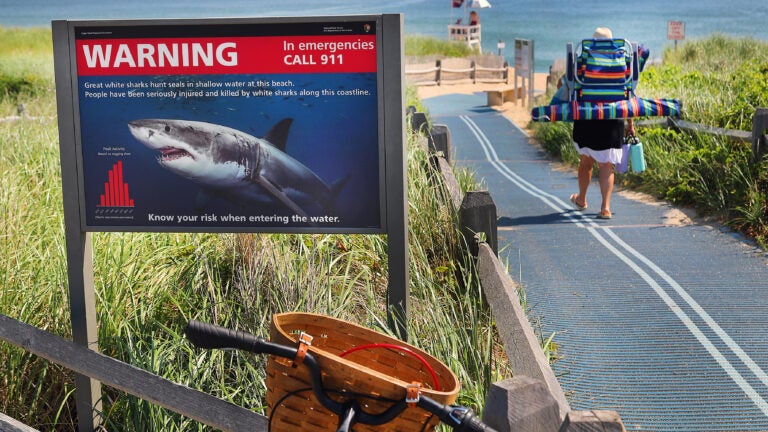Newsletter Signup
Stay up to date on all the latest news from Boston.com

It seems every summer, shaky videos catching a glimpse of a dorsal fin glistening above the ocean water, violent attacks on seals turning the water red, or the occasional boat encounter showcasing a passing shark’s scary teeth go viral on social media.
Before long, every major news outlet has posted the video, capturing audiences’ attention by questioning whether the waters off the coast of Massachusetts are safe anymore.
“People get sharks on their brain,” said Greg Skomal, a Massachusetts Division of Marine Fisheries shark expert.
As Skomal simply put it, “Sharks sell,” and now, “Every summer is the summer of the shark.”
To an extent, that’s been true ever since the release of “Jaws” in 1975. But it may be more relevant today than ever, judging by the trailer for the upcoming documentary “Great White Summer.”
The documentary, directed by Nick Budabin — known for reality TV shows like “Legends of the Fork,” “Rooms We Love” and “MTV’s Bugging Out,” and produced by Matt Elkind, known for “Family Karma,” “The Real Housewives of New York City” and “House of DVF” — shows Cape Codders turning against one another after a boogie boarder was killed by a shark in 2018, showcasing their fears.
However, with shark sightings seemingly becoming a regular occurrence along the coast, the question is: Are sharks truly becoming more common, or is it still rare to run into one?
The answer, shark experts and fishermen say, is — yes and no.
For one, it’s true that there really are at least some more sharks than there used to be in the region, increasing the odds. This is especially true with the resurgence of the great white due to the increase in the seal population, their main source of nutrients, said Skomal.
Skomal said the region may also be seeing more southern species traveling here due to the shifting climate. However, there is no data to support this theory yet.
In addition, seasonal visitors like the sand tiger, sandbar, and dusky shark all had their populations hit hard by the end of the 20th century due to overfishing and the explosion of shark fisheries in the 1980s and ’90s.
Since then, the U.S. has implemented safeguards to protect the overexploited and overfished. Thus, some of the resurgence can be attributed to these added protections.
John Chisholm, a shark expert with the New England Aquarium, noted that this year has seen a record number of filter-feeding basking sharks, the most in the last 12 years. Basking sharks, which can grow to 36 feet in length, tend to stay near the surface, making them easier to spot.
But there are other factors at play, too, that are raising the visibility of sharks — advances in hand-held technology, for one.
Chisholm noted that everyone now has a cell phone that can snap a picture or take a video and send it to social media.
Beforehand, to confirm a shark sighting, Skomal had to do it by word-of-mouth and chasing down sources, sometimes for months. Chisholm said fishermen might have seen sharks but never reported them because they were a part of everyday life.
Technology has made it much easier to record what one is looking at, making it easier for researchers to identify what is out there.
In addition, Chisholm said with the advent of the Sharkivity app that tracks great white sharks, more people are reporting what they see.
Chisholm said that because the Cape area is one of the most predictable spots in the world for sharks, people are coming to look for them. There are many eco-tourism trips, and people fly drones and spotter planes and seek out hot spots, such as a dead whale carcass, to spot them.
With the hot weather, more people are out on the water in their boats, swimming, surfing, and kitesurfing, putting more eyes on the water and increasing their chances.
However, there are day fishermen who are always out on the water and still don’t come across sharks.
Captain Mike Bosley of Dragon Fly Sportsfishing says he rarely runs into sharks unless he is out looking for them as part of his shark tours, which use the aid of a spotter plane.
Bosely said that sharks don’t prey on fish. They’re looking for seals, which is why he thinks his fishing expeditions miss them.
“(Shark sightings) grab the public,” said Bosley. “It is such a visceral thing for people.”
However, he said, “I don’t think it is a big deal, and I don’t think it is happening frequently — at least in my cohort in the Outer Cape.”
Chisholm says even though there are more sharks in the water, it’s not an overwhelming number.
Most of the sightings are misidentifications, or from researchers who are seeking sharks out, he said.
“It’s still pretty rare to see a shark on the beach,” said Chisholm. “But it is occurring.”
Stay up to date on all the latest news from Boston.com





Stay up to date with everything Boston. Receive the latest news and breaking updates, straight from our newsroom to your inbox.
Conversation
This discussion has ended. Please join elsewhere on Boston.com